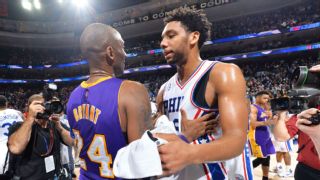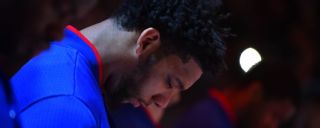Jahlil Okafor turned 20 years old on Dec. 15.
A milestone? Maybe. But for what the 76ers rookie has endured in the first two months of his NBA career, he probably stopped feeling like a teenager long before his birthday.
When the two off-court incidents involving Okafor (one for speeding, the other for getting into a fight outside of a bar) surfaced last month (along with a more recent clip of Jahlil sharing a gang handshake with one of his teammates during game introductions), conventional wisdom suggested it was indicative of the Sixers' needing a babysitter in the locker room and of who Jahlil was -- or was becoming -- as a young man.
"[I disagree] because he's not that type of person at all," Okafor's father, Chuckwudi, told me over the phone. "He's not that type of kid at all. So it's no way possible for this to be something to deal with down the line or something that's going to happen over and over again. It was just a f----- up incident."
He continued: "No one wants to see their kid go through anything [negative], but it happened. You learn from it and move on. And that's life."
But let's explore further what impact "this moment" could actually have on Okafor and on his career.
While all of the public comments and concerns are fair and reasonable under the circumstances, is it possible to view the incidents and the two-game suspension that followed as a possible motivating force?
A blessing in disguise. A necessary evil.
And what Okafor will learn from this, what his takeaway will be -- not necessarily just from his behavior, but from the fallout of his behavior -- could be the life-changing detail that is sometimes the difference from an athlete having a marginal career to having a legendary one.
In a recent SB Nation story, writer Ricky O'Donnell spoke with those close to Okafor about their concerns. The general consensus? Jahlil was 19, he made a mistake. Everyone makes mistakes at 19.
Age 20: a milestone? Hopefully.
That's how Jeff Capel, who was Jah's assistant coach at Duke and has grown especially close to Okafor, sees it.
"That was one of the things I told him once these things started to come out, 'This is going to propel you to get to something great,'" Capel told me. "I think all of this is going to help him.
"Look, he made a mistake, he's learned from [it] and I think it will help make him a better player, help make him a better man, help make him a better leader. He's never been through anything like this before, and as I told him, 'Don't let frustration win.'"
Okafor's AAU coach, Michael Irvin, agrees.
"It could be what triggers him, and it should be what triggers him, because now he understands quickly what the NBA is all about. Sometimes you get it one year later, two or three years later, but Jahlil, he got it early.
"So now he's saying to himself: 'You know what, I'm just gonna focus on basketball. All of this off-the-court stuff, I'm going to just sit in the house, I'm going to relax and focus more so on the game because now I know if I do anything wrong how it's going to be, how I'm going to be treated.' Because Jahlil wants to be great at the game, he doesn't just want to be good. He wants to go down as one of the best."
Proof that this theory is applicable is evident in his first nine games since returning from the suspension. Okafor posted four 20-point games in a row (the first Sixers rookie since Allen Iverson to accomplish that) and led the team in scoring six times in that span.
If his season averages of 17.6 points and 7.9 rebounds hold through the rest of the season, it will be the most by any rookie since Blake Griffin averaged 22.5 PPG and 12.1 RPG in 2010-11. (And Griffin was two years older than Jahlil when he started his NBA career.)
Adversity is often a catalyst. Especially for athletes with perceived promise. For Kobe Bryant, it was those three air balls against Utah in the playoffs in his rookie season. For Roy Jones Jr., it was losing the gold medal in Korea during the 1988 Olympics. For Michael Jordan, it was getting cut from his high school varsity team. For Tom Brady, it was being drafted No. 199 overall.
And even though those setbacks weren't the same in nature as Okafor's, it is as if the humbling that came from enduring those moments so early in their careers created a laser-like focus and drive, tapping into a greatness they probably didn't know at the time existed, because what they had to go through soon after brought out the best in them.
"Look, in life you are going to learn lessons one way or the other," Okafor's agent, Bill Duffy, said during a phone conversation. "At some point, something in your life is going to happen, some adversity. To me it's always better to learn them early. So to get where [Okafor] really understands the gravity of his stature, literally and figuratively, and how a professional life is and how to be in a challenging, losing environment and culture, for him to be able to learn how to overcome that -- which he will learn to overcome -- he will be much better off for it."
Even Bryant, after being the victim of the only win the 76ers have had so far this season, understood the importance of the moment for Okafor. According to Capel, who asked Okafor what Kobe said to him after the game, Bryant said: "Big fella, don't beat yourself up. You made a mistake, but this is going to help you get better."

And if anyone questions Kobe on the reverse power an ill-fated, off-the-court incident can have on a career, just look at what he was able to do with his after 2003.
Those close to Okafor believe everything, not just this, in his life has happened for a reason. Ever since the days of the video tapes of him in diapers and being barely able to walk but somehow dunking on rounded out clothes hangers suspended 3 feet off the floor became our introduction to him. His evolution into who he was going to become has been molded by the purpose of all the events -- tragic or triumphant -- that have occurred in his life.
"It happened for a reason," Irvin said. "It's good for him. I mean, we don't want anyone to have to go through things, but it's life. So for Jahlil to have to experience this now and then adjust to it the way that he already has, that's showing me that, man, this kid is really focused. He's trying to do great things."
Based off of Okafor's previous 19 years in this world, those close to him believe he has the strength to turn this situation back around.
Or as his father said, "You are talking about one blemish on a 20-year person, not a career. An entire life. A kid that has never given me any problems at all. He made my life easy. So, naw, can't anyone tell me a damn thing about him. He's been perfect his whole life."
Let's set this straight: When you are 9 years old and your mother dies, when you are the one who had to make the call to 911, when you are the one who had to call your father to tell him that something happened to your mom, 10 years later getting caught speeding and into a physical altercation on the streets of Boston (while you are a Sixer, no less) are not the incidents that are going to shape your life. That's already been done.
But the results that have come from these recent incidents, the aftermath of them, the lessons learned because of them do have the ability to provide a focus to replace the words a mother would have told her son had she been around or with him as he walked through the fire.
Jahlil Okafor has the power to make the worst moment of his NBA life become the best thing that has ever happened to him.
As Duffy said almost as a warning to the game of basketball itself, "Now you all woke him up."


